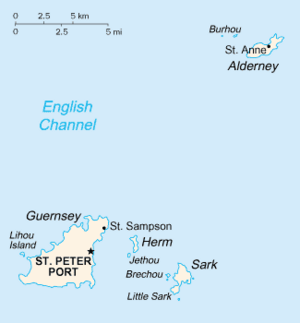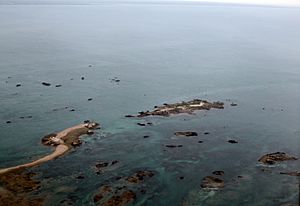-hou facts for kids
Have you ever wondered what the end of some island names means, like "Lihou" or "Jethou"? The part -hou is a special ending you'll find in many names in the Channel Islands and in a part of France called Normandy.
This ending comes from an old language called Old Norse. In Old Norse, the word holmr meant a small island. Over time, as languages changed, holmr became -hou in the Norman language. You might also see "holm" in other English names, which comes from the same Old Norse word. Even today, you can find this root in modern languages like in the city name Stockholm. Other similar words like hommet or houmet also come from this same old root, meaning a small island.
Contents
Islands in the Bailiwick of Guernsey
The Bailiwick of Guernsey is a group of islands. Many small islands and rocks around the main islands have names ending in -hou. Here are some examples:
- Near Guernsey itself:
- Lihou
- Les Houmets, which includes Houmet Benest/Benet, Houmet Paradis, and Houmet Hommetol (also called Omptolle).
- Near Alderney:
- Near Herm:
- Jethou
- Le Plat Houmet
- Near Sark:
Islands in the Bailiwick of Jersey
The Bailiwick of Jersey also has many islands and rocks with names that use the -hou ending or similar words. These names help us remember their history and what they look like.
- Les Écréhous
- Le Plat Hommeit
- Le Hommet du Ouaisné
- Les Hommets
- La Rocco (This name comes from rocque-hou, meaning a rocky islet.)
- Icho (This name comes from ic-hou.)
Places in Normandy, France
The -hou ending isn't just found on islands. It also appears in the names of towns and villages in Normandy, a region in France that has strong historical ties to the Channel Islands. This shows how the Norman language and its words spread.
- Tatihou
- Quettehou
- Néhou
- Tribehou
Images for kids
 | Jackie Robinson |
 | Jack Johnson |
 | Althea Gibson |
 | Arthur Ashe |
 | Muhammad Ali |




